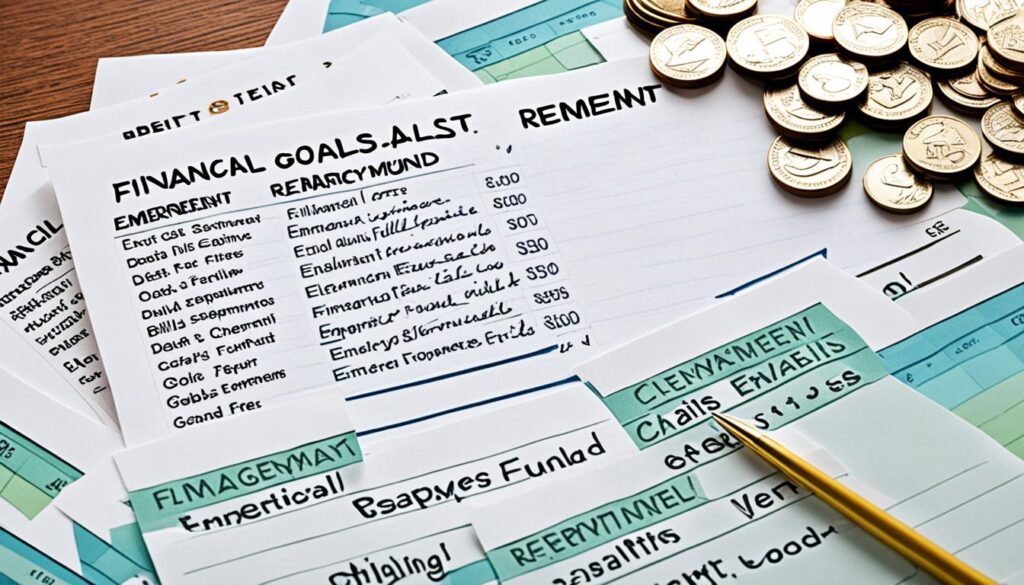Smart Money Management Tips for You

Did you know that about 78% of Americans are living paycheck to paycheck? It can seem tough to manage your money well, but it’s key for stability and future success. This article offers practical tips. These will help you with budgeting, tracking expenses, and setting financial goals. By using these strategies, you can gain control over your finances and aim for your dreams.
Track Your Expenses and Create a Budget
Effective money management starts with knowing your financial situation. Begin by tracking your expenses and putting them into groups. You can use a notepad, a spreadsheet, or an online tool for this. Keeping an eye on every purchase helps you see how you spend your money. It shows where you might be able to spend less.
Understand what you spend each month first. Then, match your spending with what you make to form a plan. Think about your pay and the bills you have to pay every month, like housing, utilities, food, and getting around. Remember to also include costs that don’t happen every month, such as fixing your car or unexpected medical bills. Planning for these surprises makes sure you’re ready for them.
Try to set some of your earnings aside for savings. Start with a small amount and aim to save more as you go. Saving money gives you a cushion for financial emergencies and lets you work towards bigger financial dreams.
Creating a budget isn’t about cutting out every fun thing. It’s about choosing how to spend your money wisely. Knowing where your money goes and planning for how to use it helps you take charge of your finances. This way, you can make choices that fit your goals and values better.
Quote:
“Budgeting has only one rule: Do not go over budget.” – Leslie Tayne
Benefits of tracking expenses and creating a budget:
- Gain insights into spending habits and find areas to cut back.
- Ensure all expenses are accounted for, including irregular ones.
- Align income with expenses and avoid living beyond your means.
- Establish a savings plan and work towards financial goals.
- Make informed financial decisions and prioritize spending.
By watching your spending and setting a budget, you steer your financial future. This leads to a more stable and secure life ahead.
Cut Back on Nonessential Expenses
To save more money, start by cutting costs that aren’t vital. Look closely at what you spend to see where you can save. This will help you have more to put away for your goals.
Entertainment Costs:
- Think about free or cheap fun. Spend time in local parks or enjoy community events. Movie nights at home can be fun and cheaper than the theater.
Dining Out:
- Try to eat at home more often. Cooking your own meals can save a lot of money. It also lets you pick the best ingredients and portion sizes.
- When you eat out, use deals and coupons from local restaurants.
Review your subscription services and club memberships to see if you really need them. Cut any that aren’t worth it. Doing this helps you avoid buying things on a whim. It also makes it easier to save up for things you really want but don’t necessarily need.
Remember, cutting back is a great way to save and meet your financial targets.
Use these tips to spend less on things you don’t really need. Then, you can save that money for what matters most to you.
Entertainment Alternatives:
Here are some cheap ways to have fun:
- Have a game night with your friends or family.
- Visit local museums and galleries on days when admission is free.
- Have a picnic in the park or go for a hike.
Smart Dining Habits:
Make eating out more budget-friendly with these ideas:
- Look for happy hours and early dinner specials at restaurants.
- Share a meal when you go out to eat. Sharing can cut costs and waste.
- Bring your own food to work instead of buying lunch every day.
Always keep in mind that small spending changes add up to big savings. Stay aware of your spending and review your budget regularly to meet your saving goals.
Set Financial Goals
Creating clear financial goals is key for managing money well. By setting specific savings goals, you make a path to financial success. Think about what you want to achieve in the short and long term.
Short-term goals might include saving for an emergency fund or a fun trip. You can reach these goals within a year or two. They’ll make you feel good once you achieve them.
Long-term goals need more time and thought. For instance, buying a house or saving for retirement. Achieving these goals often means saving and investing for many years.
Figure out how much money you need for each goal and when you want to reach them. This planning keeps you on track and motivated. Make sure your goals fit your current financial status.
Don’t forget to celebrate when you hit your savings goals. Rewarding yourself helps you keep saving. It also encourages you to aim for bigger financial dreams.
Prioritize Your Savings Goals
Firstly, think about your expenses, income, and what you want to achieve. It’s key to rank your savings targets. Don’t overlook short-term needs, such as emergencies. But, don’t forget to focus on big dreams like retirement planning too. Different accounts are good for different savings goals.
Choose based on things like min balance, fees, interest, risk, and when you need the money. Mix and match accounts to fit what you’re aiming for.

It’s vital to find a middle ground between your present and future needs. When setting your financial goals, look at what troubles you the most now. Make sure to save for current needs, emergencies, and short-term goals, like a new house or a trip.
- Look at all your financial goals. Decide what needs to be tackled now and what can wait.
- Think about your comfort with risk. This guides how much of your savings is used now versus later.
- Consider how long it takes to reach your goals. Some, like retirement, need more time than others.
After knowing your goals and your money situation, it’s time to set priorities. Saving for retirement should be high on your list. The earlier you start, the better. Also, put effort into saving for a house or your kids’ education.
Still, don’t forget about now. Keep an emergency fund and handle any debts.
Each goal needs its own financial plan. So, look into different saving and investing options. Compare things like min balance, fees, and risk. For short-term needs, easy-to-reach savings accounts are good. But, for long-term goals like retirement, accounts that earn more might be better.
“Remember, successful money management involves finding the right balance between short-term and long-term goals. Prioritize your savings goals based on their importance to your overall financial well-being.”
By sorting your saving plans, you balance now with later. Keep checking and updating your goals and how you save. With a clear savings plan, you’re on your way to meet your financial dreams.
Automate Your Saving and Investing
Saving becomes easier when you automate it. Many banks let you move money between your accounts without lifting a finger. You can pick how often and how much to save. This means part of your money goes straight to your savings, no extra effort needed.
If you choose, direct some of your paycheck to savings automatically. This is a way to make sure you save money before you even see it. It helps with achieving your savings targets.
There are also ways to make saving more fun, like with credit card rewards. With certain cards, you earn back money or points. Then, you can put this extra money towards your savings or investments.
“Automating your savings is like putting your finances on autopilot. It removes the temptation to spend and ensures that you’re consistently saving for your future.” – Financial expert
Another cool method is using spare change. Apps can round up your purchases and move the extra to savings. This simple trick can increase your savings over time.
Review and Adjust Your Budget Regularly
Managing your money wisely means you should often check and change your budget. This keeps you moving towards your money goals. Every month, spend some time looking at how you’re doing. Make any needed changes to help you save more and spend wisely.
Checking your budget often shows you if you’re hitting your money targets. You look at how much you make, what you spend, and how much you save. This makes sure everything matches your goals well.
“Looking at your budget often is like weighing yourself financially. It shows where you might be spending too much. Then you can fix it to stay on course.”
Tracking Progress
It’s key to keep an eye on how you’re doing financially. See if you’re saving more, cutting your debts, or achieving any other goals. Highlight the good things and be happy about them, even the tiny wins.
If you’re not doing as well, find out why during your budget check. Maybe you’re spending too much in some places. Or not saving enough. Plan how to solve these issues. Always look for ways to make your money situation better.
Identifying Issues
A vital part of budget checks is finding what problems are stopping your progress. Unexpected costs or major jumps in prices can slow you down. Once you spot these hurdles, you can work to avoid them in the future.
Using money-tracking apps or spreadsheets can shed light on your spending habits. They point out where you need to adjust your spending. Also, talking to a finance expert can offer great advice. They can help you deal with tricky money problems.
Regularly looking at your budget is crucial for staying financially healthy. By keeping track, you spot problems early. This way, you can build and stick to good money habits. And keep your financial goals within reach.
Know Your Priorities and Values
Understanding your financial priorities and values is crucial. It helps you make smart decisions. You can spend your money in ways that align with what you care about.
Think about what’s most important to you. Do you value safety, learning, or time with family? Knowing this helps you focus your money in the right places.
“Your priorities should reflect your values. Aligning your spending habits with what truly matters to you can bring a sense of fulfillment and purpose to your financial journey.”
If you love traveling, you might want to save more for it. This means spending less on things like eating out. By doing this, you’re living in line with your values.
This strategy also moves you closer to your savings goals. When you cut out unnecessary spending, you save more. Then, you can invest in the things that truly matter to you.
Aligning Your Goals with Your Values
When you set money goals, make sure they match what you believe in. Goals like buying a house or retiring should really mean something to you. They should represent what you want from life.
“By aligning your goals with your values, you create a strong sense of purpose and motivation to achieve financial success.”
Think about how your goals will change your future. This helps you decide which goals are most important. Keep your values close to stay motivated on your financial journey.
Knowing your priorities and values is critical. It leads to successful money management. You’ll make choices that help you reach your goals while feeling fulfilled.

Key Takeaways:
- Identify your financial priorities by reflecting on what matters most to you.
- Direct your financial resources towards your priorities and cut back on nonessential expenses.
- Ensure your financial goals align with your personal values for a strong sense of purpose.
- By aligning your spending habits with your values, you can make progress towards your financial goals and lead a more fulfilling life.
Build an Emergency Fund
Creating an emergency fund is key to staying financially secure. Planning for sudden events like losing a job or a medical crisis is smart. A savings cushion brings peace of mind and stability.
First, figure out how much money you need each month. Keep track of your income and spending to know this. It shows what you must set aside for essentials every month.
Then, look at how safe your job is. If it’s reliable, you can save less money, maybe 3 to 6 months’ expenses. But, if your job is risky or fluctuates, it’s wiser to aim for saving more. This protects you better during tough times.
Having extra savings is always better. It beats the stress of not being ready for hard times.
Decide how you’ll keep adding to your fund. You might do this by making automatic deposits from your salary. Or, set aside windfalls and bonuses for your emergency stash.
A financial cushion lowers stress and helps you handle bumps in the road. It’s crucial to make saving a regular thing. This way, your money stays safe, and you’re ready for whatever comes.
Putting money into an emergency fund is a wise, forward-thinking move. It guards your financial future and prepares you for life’s surprises.
Start Saving and Investing Early
Starting to save and invest early is a smart move. It allows you to earn more with compounding interest over time. Small, steady savings can grow into something large.
When saving, put part of your income towards your goals. This constant saving builds a strong financial base. It also helps you prepare for future needs. Mixing up your investments lowers risks and can lead to better gains.
Having a solid plan for saving and investing is key to being financially secure. Know what you want and make a plan to get there. It’s important to keep an eye on how your investments are doing and adjust as necessary.
If your job offers a retirement plan that matches your contributions, use it. It not only helps your own savings grow but also increases your returns. This is a big help for your future financial health.
Don’t wait too long to think about retirement. Early savings and interest mean more money later on. Start your retirement plan now. It’s essential for your future financial success.
Example Quotes:
“Start saving early and let the power of compounding interest work for you. The earlier you begin, the more time your money has to grow.” – Michael Johnson, Financial Advisor
“Retirement may seem far away, but starting to save early ensures you’ll have a comfortable future. Don’t delay, start now.” – Sarah Thompson, Retirement Planner
Key Takeaways:
- Starting to save early allows you to benefit from compounding interest.
- Consistently saving even small amounts can lead to significant long-term growth.
- Diversify your investments to minimize risk and maximize returns.
- Develop a long-term savings and investment plan tailored to your goals.
- Take advantage of employer matching contributions to boost your retirement savings.
Conclusion
Managing your money wisely is key to long-term financial success. Follow the advice in this article to take control of your finances. With this, you can reach your goals and secure your future.
First, track what you spend and make a budget that fits your earnings. Cut out things you don’t really need. Also, focus on saving. Set up automatic savings to always put money aside. It’s good to review your budget often and make changes as needed.
By being dedicated and careful with your money, you can form good financial habits. This will lead to financial well-being. You just need to use these money tips and keep moving towards your big financial objectives.






